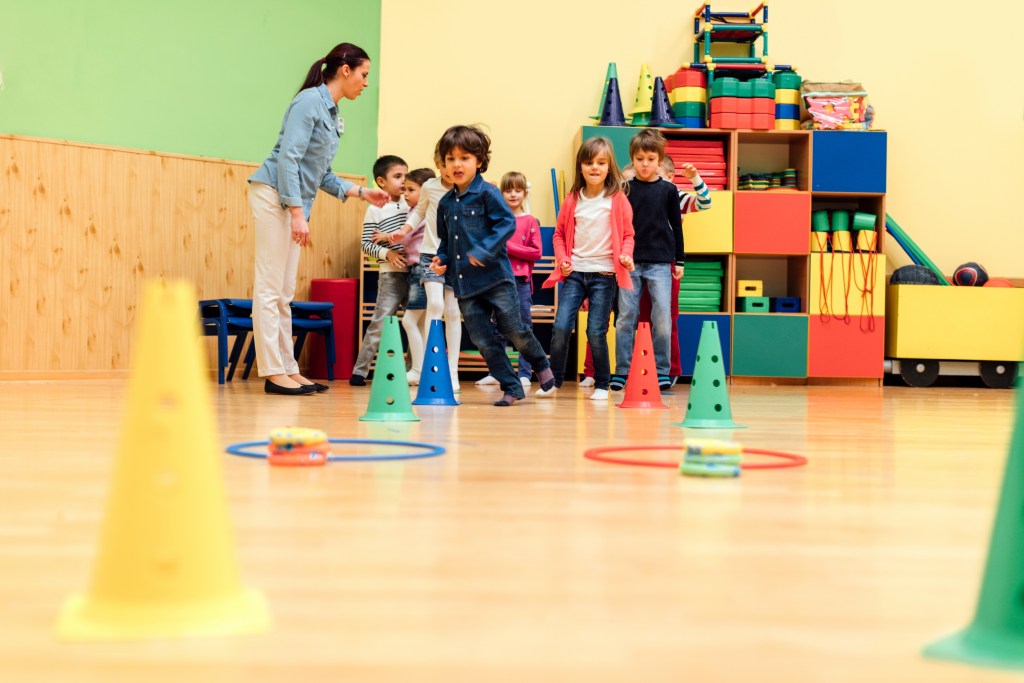Day care is typically a fun place kids go where they get to socialize with other children, play silly day care games, and spend some time away from their parents under the care of other adults. Whether your child is in a home day care setting or a day care center, chances are much of their day involves playing fun games with their caregivers and peers.
While you may think these games your child is playing are just a way for them to enjoy their time away from home with their friends, many of those games are actually preparing them for when they go to school. Play-led learning is making a comeback in day cares and preschools, and play is an important way for children to learn and explore their surroundings without the pressure of structured learning.
You may dismiss these games as silly day care games, but they’re actually teaching your child many valuable skills that will help them when they transition to school.

Why day care games for toddlers are important
For most of us, our life consists of schedules and structure and running from one commitment to another. Between work and extracurricular activities, there often isn’t a lot of time left for play or free time. Play becomes even more important for toddlers in a day care setting because they may not have a lot of time for play otherwise.
As KinderCare notes, toddlers are constantly asked to follow rules and adhere to schedules, so being able to play silly games with friends at day care allows them the opportunity to express themselves differently. Whether they are making up the game or expressing themselves and their emotions through games like role-playing, dress-up, or puppets, games help children learn how to solve problems and get creative. Playing games also helps toddlers develop social skills as well as their language and counting skills without feeling like work.
Games to play at day care
You may think a rousing game of duck, duck, goose or musical chairs is just a way for kids to burn off some energy while at day care, and you’re not wrong. However, these games are also teaching kids some pretty great skills they’ll need once they start school.
These games can teach kids strategic skills, how to win and lose gracefully, how to practice self-control, and the importance of patience and taking turns, Whitby School writes. Games like Simon says help children learn how to be leaders, while games like hide-and-seek teach children about problem-solving and critical thinking. Even though these games are a lot of fun for the children to participate in, they’re also requiring your children to practice different skills and techniques as they play that they may not learn otherwise.

Ready for school
It can be easy for parents to want to focus on a child’s reading or writing skills before they begin school, but there are so many other skills that a child needs to learn to be ready to enter the classroom that day care games help with. Many of these games teach your child about learning to sit still and listen attentively while a teacher gives them directions, or how to follow instructions to ensure they are playing the game properly.
These are all crucial skills a child must learn when they step into a formal classroom. Taking turns, accepting disappointment, and using their imagination to come up with their own games are all skills these games teach your toddler that will benefit them immensely once they begin in a traditional school setting.
Playing games at school also helps your child with their memory, speech, and language abilities, as well as recognizing words and letters, all while adapting to an environment that will be very similar to a traditional school. Having them not only feel comfortable when attending day care, but thoroughly enjoy their time there as they use games to learn and express themselves will help when the time to transition to school arrives.
Incorporating day care games like hide-and-seek, hopscotch, red light, green light, and more at home can also help your child prepare for school. It can be tempting to focus on sight words, reading, and teaching basic math skills to your child without realizing that you can teach many much-needed skills to your child through games.
The best part about incorporating play-led learning at home is that everyone enjoys that type of learning. It can be difficult to get a toddler or preschooler to sit and focus on flashcards or writing their numbers and letters, but when you make learning a fun game, it can be more enjoyable for everyone.



